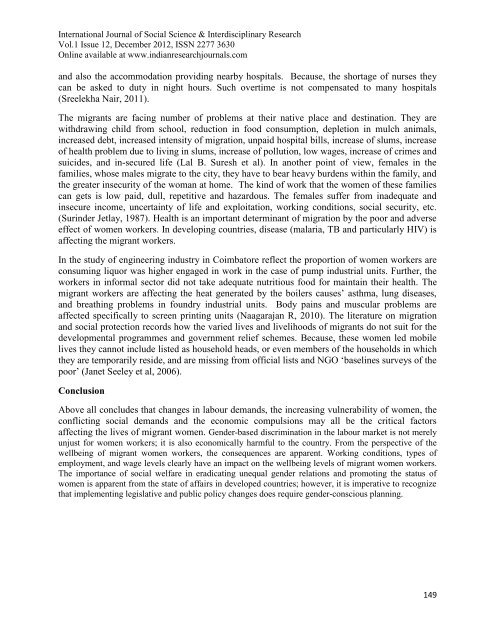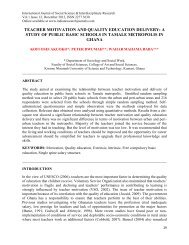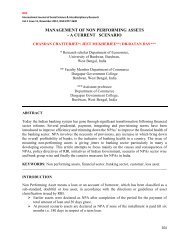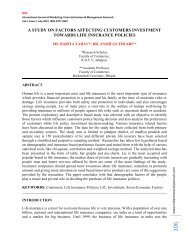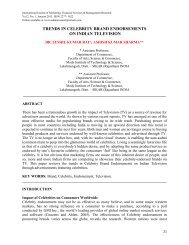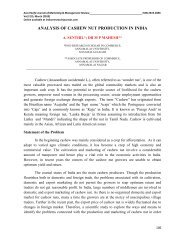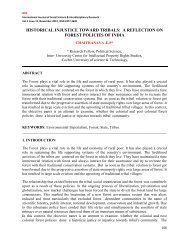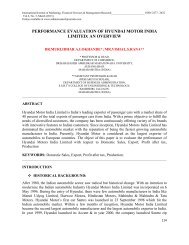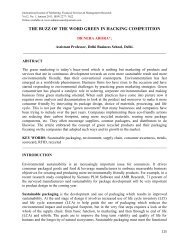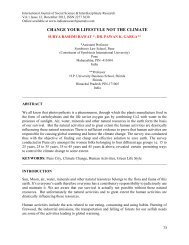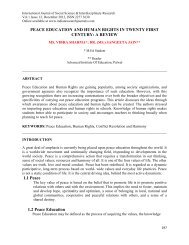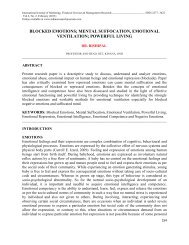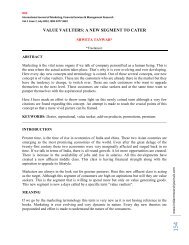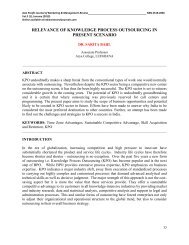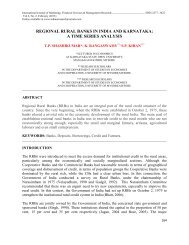rural â urban migration: a gender perspective analysis
rural â urban migration: a gender perspective analysis
rural â urban migration: a gender perspective analysis
You also want an ePaper? Increase the reach of your titles
YUMPU automatically turns print PDFs into web optimized ePapers that Google loves.
International Journal of Social Science & Interdisciplinary Research<br />
Vol.1 Issue 12, December 2012, ISSN 2277 3630<br />
Online available at www.indianresearchjournals.com<br />
and also the accommodation providing nearby hospitals. Because, the shortage of nurses they<br />
can be asked to duty in night hours. Such overtime is not compensated to many hospitals<br />
(Sreelekha Nair, 2011).<br />
The migrants are facing number of problems at their native place and destination. They are<br />
withdrawing child from school, reduction in food consumption, depletion in mulch animals,<br />
increased debt, increased intensity of <strong>migration</strong>, unpaid hospital bills, increase of slums, increase<br />
of health problem due to living in slums, increase of pollution, low wages, increase of crimes and<br />
suicides, and in-secured life (Lal B. Suresh et al). In another point of view, females in the<br />
families, whose males migrate to the city, they have to bear heavy burdens within the family, and<br />
the greater insecurity of the woman at home. The kind of work that the women of these families<br />
can gets is low paid, dull, repetitive and hazardous. The females suffer from inadequate and<br />
insecure income, uncertainty of life and exploitation, working conditions, social security, etc.<br />
(Surinder Jetlay, 1987). Health is an important determinant of <strong>migration</strong> by the poor and adverse<br />
effect of women workers. In developing countries, disease (malaria, TB and particularly HIV) is<br />
affecting the migrant workers.<br />
In the study of engineering industry in Coimbatore reflect the proportion of women workers are<br />
consuming liquor was higher engaged in work in the case of pump industrial units. Further, the<br />
workers in informal sector did not take adequate nutritious food for maintain their health. The<br />
migrant workers are affecting the heat generated by the boilers causes‟ asthma, lung diseases,<br />
and breathing problems in foundry industrial units. Body pains and muscular problems are<br />
affected specifically to screen printing units (Naagarajan R, 2010). The literature on <strong>migration</strong><br />
and social protection records how the varied lives and livelihoods of migrants do not suit for the<br />
developmental programmes and government relief schemes. Because, these women led mobile<br />
lives they cannot include listed as household heads, or even members of the households in which<br />
they are temporarily reside, and are missing from official lists and NGO „baselines surveys of the<br />
poor‟ (Janet Seeley et al, 2006).<br />
Conclusion<br />
Above all concludes that changes in labour demands, the increasing vulnerability of women, the<br />
conflicting social demands and the economic compulsions may all be the critical factors<br />
affecting the lives of migrant women. Gender-based discrimination in the labour market is not merely<br />
unjust for women workers; it is also economically harmful to the country. From the <strong>perspective</strong> of the<br />
wellbeing of migrant women workers, the consequences are apparent. Working conditions, types of<br />
employment, and wage levels clearly have an impact on the wellbeing levels of migrant women workers.<br />
The importance of social welfare in eradicating unequal <strong>gender</strong> relations and promoting the status of<br />
women is apparent from the state of affairs in developed countries; however, it is imperative to recognize<br />
that implementing legislative and public policy changes does require <strong>gender</strong>-conscious planning.<br />
149


